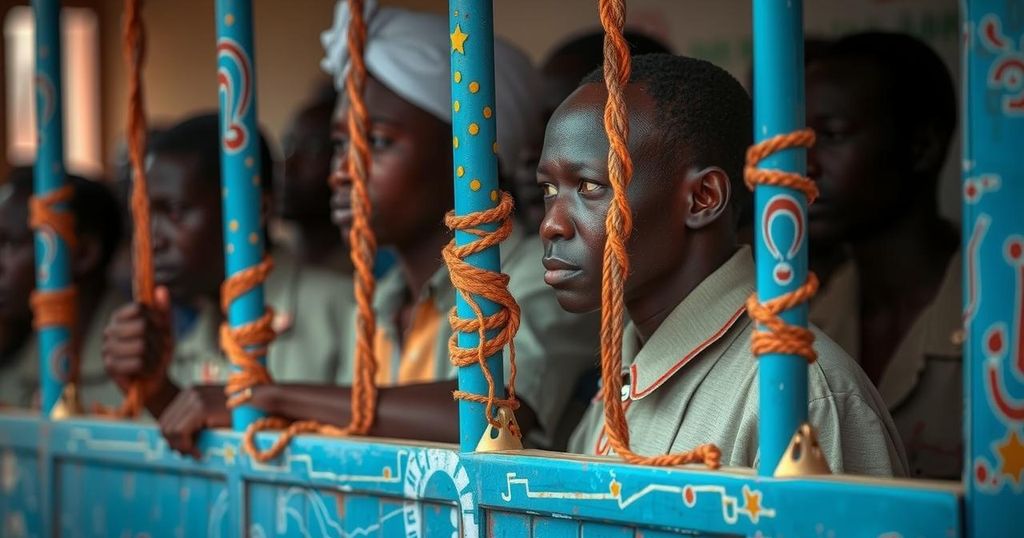UN Report Reveals Systemic Arbitrary Detention Issues in South Sudan

A UN report highlights widespread arbitrary detention in South Sudan, documenting human rights abuses by government forces and armed groups from January 2023 to May 2024. It calls for the government to end these practices, emphasizes the socioeconomic impacts on families, and advocates for judicial reforms and humanitarian assistance as 70% of the population faces urgent needs.
A recent joint report published by the United Nations Mission in South Sudan (UNMISS) and the Office of the UN High Commissioner for Human Rights (OHCHR) has uncovered a troubling pattern of arbitrary detention within South Sudan. Covering events from January 2023 to May 2024, the report details numerous incidents of unlawful arrests and detentions, affecting a broad spectrum of individuals, including women and girls who faced detention for rejecting arranged marriages or seeking divorce. Additionally, the report characterizes arbitrary detention as a method of intimidation directed at journalists, human rights advocates, and political dissenters.
The findings indicate that men represent the majority of those subjected to arbitrary detention, with detrimental socio-economic consequences impacting their families. The report also emphasizes the plight of individuals with mental health conditions, who are often imprisoned without legal due process, constituting another aspect of arbitrary detention. The analysis attributes these widespread violations to a frail justice system, lack of accountability, and a decline in the rule of law throughout South Sudan. Furthermore, the report asserts that such practices perpetuate poverty, hinder economic growth, and contribute to health crises.
In anticipation of the upcoming elections scheduled for December 2026, the report advocates for sustained technical assistance and the enhancement of judicial capabilities at both national and state levels. UNMISS and OHCHR have urged the South Sudanese government to cease arbitrary detentions and ensure adherence to international human rights standards for all detainees. They also recommend immediate independent investigations and prosecutions for individuals accused of human rights abuses.
The report highlights a governmental initiative from July 28, 2022, which inaugurated an ad hoc Judicial Reform Committee, assigned with the mandate to review relevant laws and advise on reforms to bolster judicial effectiveness. Despite the absence of public access to the Committee’s findings, anticipated recommendations include the establishment of an independent judicial system that guarantees equal access to justice and safeguards vulnerable populations from violence and discrimination.
The UN Office for the Coordination of Humanitarian Affairs (OCHA) projects that nearly 70 percent of South Sudan’s population, approximating 9.3 million individuals, will require humanitarian assistance in the forthcoming year. Factors such as conflict, climate change impacts, economic instability, disease outbreaks, and the fallout from the conflict in neighboring Sudan contribute to the ongoing humanitarian crisis. Furthermore, since April of the previous year, over 900,000 people have fled to South Sudan, with an additional 337,000 expected in the upcoming year.
The recent UN report addresses ongoing human rights issues in South Sudan, particularly focusing on arbitrary detentions carried out by government security forces and armed groups. The report is notable for its documentation of human rights abuses affecting diverse groups, including women, journalists, and individuals with mental health conditions. This analytic coverage serves as a crucial indicator of the broader judicial and social challenges facing South Sudan, particularly amidst impending elections and escalating humanitarian needs in the country.
The joint UN report serves as a crucial alert regarding the systemic issue of arbitrary detention in South Sudan, urging the government to rectify these violations and implement judicial reforms. As South Sudan faces severe humanitarian challenges and prepares for upcoming elections, the need for accountability, enhanced judicial structures, and adherence to international human rights obligations has never been more pressing. Continued international attention and support are necessary to address these critical issues.
Original Source: www.jurist.org








